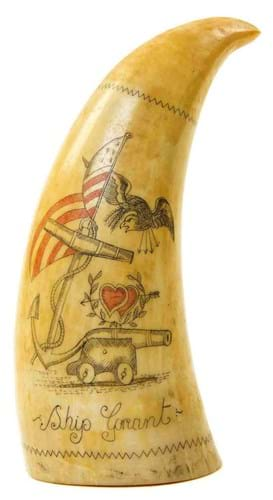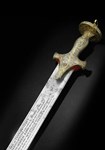The Department for Environment, Food and Rural Affairs (Defra) announced on May 23 that the trade in ivory from walrus, narwhal, killer and sperm whale and hippopotamus will be subject to stricter controls under the extension.
The act came into force in June last year for elephant ivory. This extension to the law will come into force following due process through parliament, which could take many months. As reported in ATG No 2503, a consultation on extending the ban to other species was launched in 2021.
These five species are already listed under the Convention on International Trade in Endangered Species of Fauna and Flora (CITES). Previously only items older than 1947 could be traded, but this new ban goes much further.
The extension will particularly affect the trade in antique scrimshaw from walrus tusks and whale teeth. However, whale products such as baleen and bone are not part of the extension.
Cultural tradition
Marine antiques auction specialist Charles Miller said: “This is just mindless vandalism to not to allow the sale of antiques.
“Scrimshaw collected today are those engraved by sailors prior to 1900 (particularly the golden age 1800-60) so there is not demand here for modern items. Antique narwhal tusks are treasured. People don’t want modern ones.
“The antiques trade is a perfectly harmless business. We are green and by selling on these items we are recycling. Now, with this ban, items will be chucked away. They are ending a cultural tradition going back two centuries.”
Referring to the government’s plan, he added: “We are not dealing with people that have a cogent understanding of how the antiques trade operates.”
Miller predicts a “brief spike in sales with people having a clear-out ahead of the ban”.
The British Antique Dealers’ Association (BADA) said it is currently considering its response to the government to “offer a workable solution to this extension”.
Ashley Gallant, managing director of BADA, said: “Following our submission to the consultation in 2021, we are extremely disappointed.
“Because the majority of objects using marine ivories are comprised of solid ivory, very few would be eligible for registration as ‘deminimis’ items, and hardly any would be eligible for the ‘important item’ exemption.
“Scrimshaw, antiquities and some indigenous items [such as Inuit carvings and domestic items] will be very badly hit.
“The government has chosen [to] penalise the trade in genuine cultural property, while claiming that this precautionary measure will protect these vulnerable specie s. The current conservation status of each of the five species varies, as does the nature of the threats to them, none of which has been taken into account by the government in extending the Act.”
“Imperils scholarship”
Martin Levy of dealership H Blairman & Sons said: “The recent additions to the Ivory Act simply compound a piece of lazy legislation that already imperils scholarship on historic works of art that happen to be made of endangered species. The act does nothing meaningful to protect wildlife.”
Under the Ivory Act antiques containing ivory can be exempt from the ban under four narrow conditions. These exemptions will also apply to the extended ban for ivory from the five species.
The exemptions are:
• Pre-1947 items containing less than 10% ivory by volume.
• Pre-1975 musical instruments containing less than 20% ivory by volume.
• Pre-1918 portrait miniatures with a surface area of no more than 320 sq cm.
• Pre-1918 items deemed of outstanding artistic, cultural or historical value.
The registration process for de minimis and portrait miniature exemptions costs £20 per item or £50 for a group of objects (up to a maximum of 20). Owners wishing to sell a pre-1918 ivory item of outstanding artistic, cultural or historical value must pay a fee of £250 and submit details to a committee of museum specialists for assessment.















